5 Interview Worksheet Examples to Download
You could be from the Human Resource department and is given the position to hold the job interview or you could be an intern or you could be a reporter and is given the task to report news from a new beat assignment or you could have a study and that you have to interview people to collect data.
Whoever you are, you might have a dire need to improve or enhance your interviewing skills because you would need it for your profession right now. One way of doing so is with the help of interview worksheets. Thes worksheets provide ways on how you can complete your skills in interviewing. We have provided ten worksheets in this article that will surely help you improve and enhance your interviewing skills.
Interviews are very useful when it comes to obtaining information from people in an in-depth way. Whether you are interviewing a person for a job or interviewing a resource person for your news article, interviews are a great tool for you to know the necessary information you need to acquire from the person you just met. You may also see 10 Grammar Worksheets – Examples & Importance.
Interviewing is also an important skill to have. It is a skill that will enable you to know what an individual is thinking or feeling and most importantly, their opinions about the question you threw at them. It is through the skill of interviewing that you will gain relevant issues that have been given deaf ears and blind eyes and that these issues will finally be given a solution. This skill will help in uncovering an information that is relevant and crucial. You may also see 11+ SWOT Analysis Worksheet Examples in PDF.
Informational Interview Worksheet
Job Interview Worksheets
Advantages and Disadvantages of Interviews
Advantages of Interviews
Interviews are used to obtain the necessary and detailed information about a person’s views, opinions, and even their feelings and perceptions. You may also see 10 Self-Assessment Worksheet Examples in PDF.
Interviews, when effective questions are being asked, will allow more followup questions that could make the interview more in-depth. If there are responses that are ambiguous, you can make clear all those during interviews. You may also see 10 Alphabet Worksheet Examples in PDF.
The information you report will not be held against you because you have a proof that you are not just putting words into someone’s mouth. You may also see Expense Worksheet Examples.
Disadvantages of Interviews
Interviews can be time-consuming. With all the followup questions that could follow even after the answer of the respondent, more time will be consumed. The process of interviewing itself can be very time-consuming because you will then have to set-up a schedule and list down all the necessary and accurate questions to ask for the necessary and accurate answers to be obtained. And, when you would finally create a transcribed copy of the interview, it would take time to transcribe word-for-word. You may also see Alphabet Worksheet Examples.
Learner’s Worksheet – A Job Interview
Job Interview Questions Worksheet
Pre-Interview Worksheet
The Common Interview Process
Here are the steps in the common way interviews are done:
Stage 1: What Information Do You Need?
It is at this stage where you will determine what information is required and what you want to find out from the person you are going to interview. This is the stage where you are going to think of all the questions you want to ask your interviewee. You may also see Budget Worksheets.
Stage 2: What Method are You Going to Use in Collecting Data?
Now that you have decided what information you want to acquire from the interviewees, you now have to decide the method or how you are going to collect data from your respondents or from the person you are going to interview. Your interview could be conducted by face-to-face, by using chat messaging services, but it is strongly suggested that you should conduct the interview personally because the latter does not have the assurance that your interviewee’s answers are not coached or influenced by other people around him or her that you cannot see. You can also conduct an interview via a telephone call and you just ask permission from the interviewee that you are going to record. You can also conduct an interview via video phone call. This is another alternative to substitute face-to-face interviews instead of just having a chat messaging where you cannot see the person you are interviewing. You may also see 10 Coaching Worksheet Examples in PDF.
Stage 3: Set the Interview
This is the time when you would finally schedule the time, place, and date of the interview. Make sure you have set the interview at a convenient time for the interviewee so that there will be no problems. You may also know How to Write a Newspaper Obituary (With Examples).
This is also the stage where you have to check back again the questions you have prepared. Ask yourself the following questions when you will check the questions again:
- Are the questions easy to understand?
- Are the questions biased or not?
- Are the questions necessary to the evaluation?
- Are the questions too intimidating to answer?
- Will interviewees be willing to provide the information with this kind of questions?
- Are the questions applicable to all interviewees?
- Does the question allow interviewees to offer their opinions/expand on basic answers?
- Would followup questions likely to happen?
- Are these all the needed important questions or should I add more?
Stage 4: Pilot Test the Interview
While this stage can be optional especially if you do not have an extra time, conduct the interview with someone to people that are potential interviewees but are not the actual ones.
Stage 5: Conduct the Interview
Finally, you can now conduct the interview.
Before the interview, you have to ask permission from your interviewee that you are going to record the entire interview and you have to assure and confirm to them that if they will request anonymity, it will surely be granted as they wish.
You should also have to mention the purpose of your interview and how you are going to use the information you are going to obtain from them.
If you have a time limit for the interview, make sure that you stick to it.
Stage 6: Transcribe Interviews
Now that you are done with the actual interview, it is now the time for you to transcribe the interview.
Stage 7: Analyse the Transcripts
Analyzing the transcripts will enable you to effectively do the next stage which is:
Stage 8: Write, Present, and Use the Findings
Be it for a news article, a job interview or for a study, this step is the most crucial part where you will finally make use of what you have obtained from the interview. Make sure you have extensively used the article so that your efforts in conducting the entire interview process would not be put to waste.
5 Interview Worksheet Examples to Download

You could be from the Human Resource department and is given the position to hold the job interview or you could be an intern or you could be a reporter and is given the task to report news from a new beat assignment or you could have a study and that you have to interview people to collect data.
Whoever you are, you might have a dire need to improve or enhance your interviewing skills because you would need it for your profession right now. One way of doing so is with the help of interview worksheets. Thes worksheets provide ways on how you can complete your skills in interviewing. We have provided ten worksheets in this article that will surely help you improve and enhance your interviewing skills.
Interviews are very useful when it comes to obtaining information from people in an in-depth way. Whether you are interviewing a person for a job or interviewing a resource person for your news article, interviews are a great tool for you to know the necessary information you need to acquire from the person you just met. You may also see 10 Grammar Worksheets – Examples & Importance.
Interviewing is also an important skill to have. It is a skill that will enable you to know what an individual is thinking or feeling and most importantly, their opinions about the question you threw at them. It is through the skill of interviewing that you will gain relevant issues that have been given deaf ears and blind eyes and that these issues will finally be given a solution. This skill will help in uncovering an information that is relevant and crucial. You may also see 11+ SWOT Analysis Worksheet Examples in PDF.
Informational Interview Worksheet
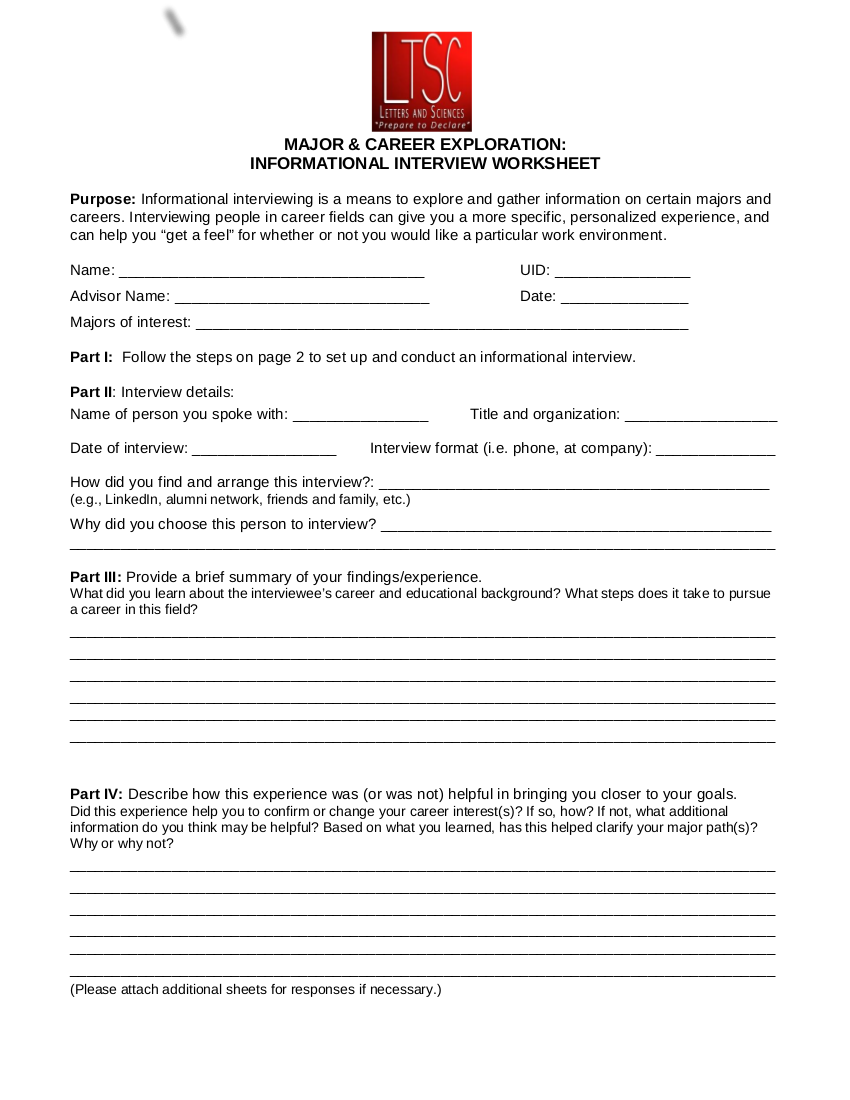
ltsc.umd.ed
Details
File Format
PDF
Size: 89.2 KB
Job Interview Worksheets
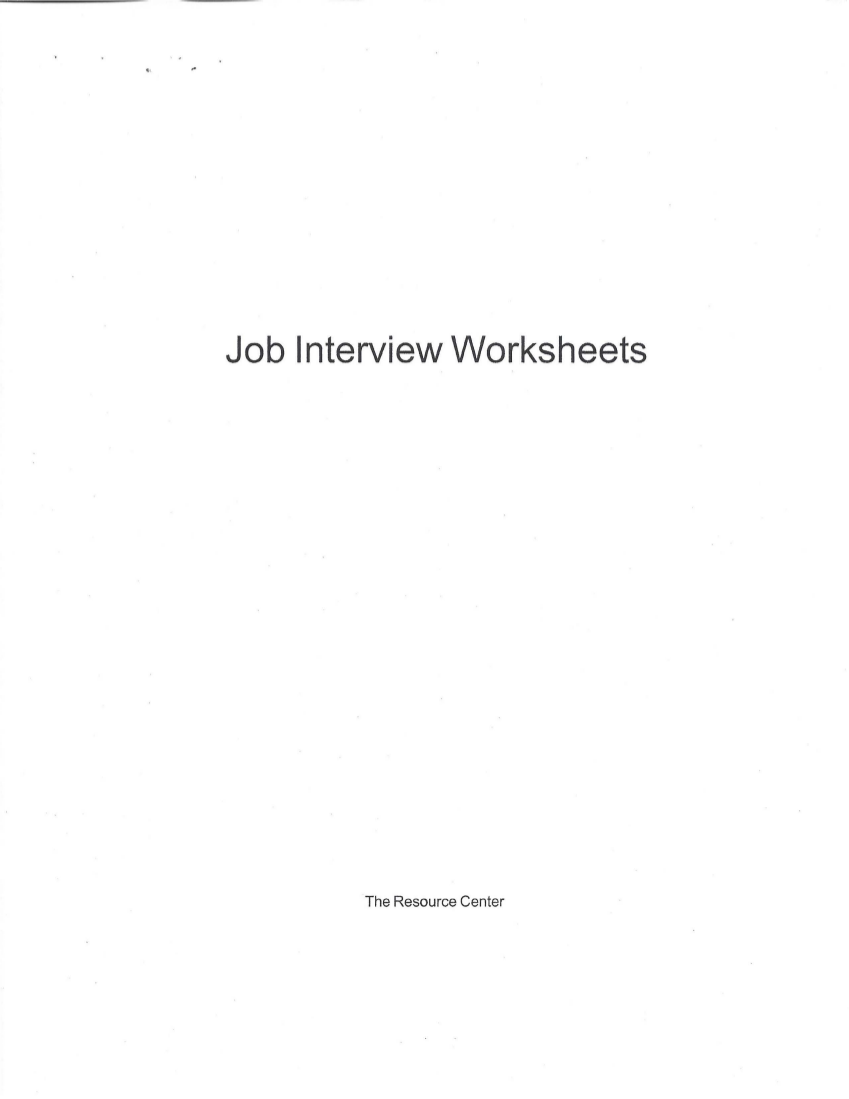
iccb.org
Details
File Format
PDF
Size: 3.8 MB
Advantages and Disadvantages of Interviews
Advantages of Interviews
Interviews are used to obtain the necessary and detailed information about a person’s views, opinions, and even their feelings and perceptions. You may also see 10 Self-Assessment Worksheet Examples in PDF.
Interviews, when effective questions are being asked, will allow more followup questions that could make the interview more in-depth. If there are responses that are ambiguous, you can make clear all those during interviews. You may also see 10 Alphabet Worksheet Examples in PDF.
The information you report will not be held against you because you have a proof that you are not just putting words into someone’s mouth. You may also see Expense Worksheet Examples.
Disadvantages of Interviews
Interviews can be time-consuming. With all the followup questions that could follow even after the answer of the respondent, more time will be consumed. The process of interviewing itself can be very time-consuming because you will then have to set-up a schedule and list down all the necessary and accurate questions to ask for the necessary and accurate answers to be obtained. And, when you would finally create a transcribed copy of the interview, it would take time to transcribe word-for-word. You may also see Alphabet Worksheet Examples.
Learner’s Worksheet – A Job Interview
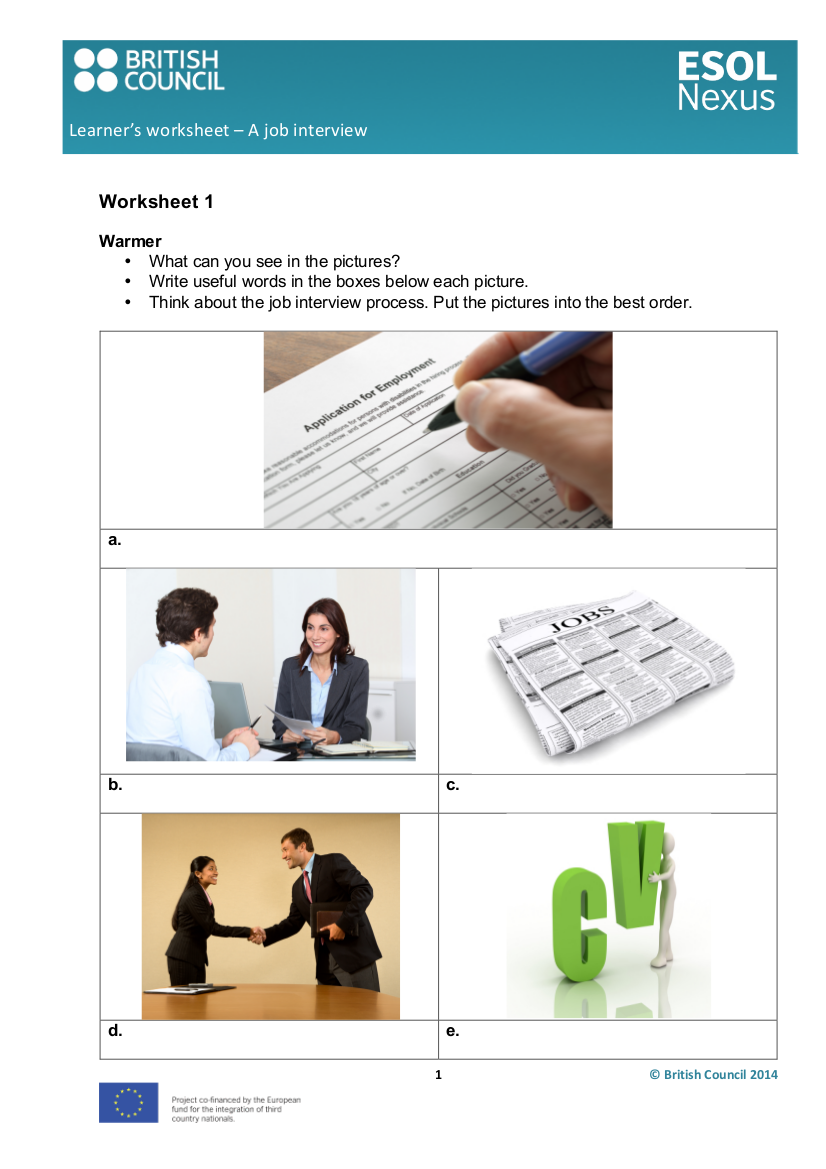
esol.britishcouncil.org
Details
File Format
PDF
Size: 1.8 MB
Job Interview Questions Worksheet
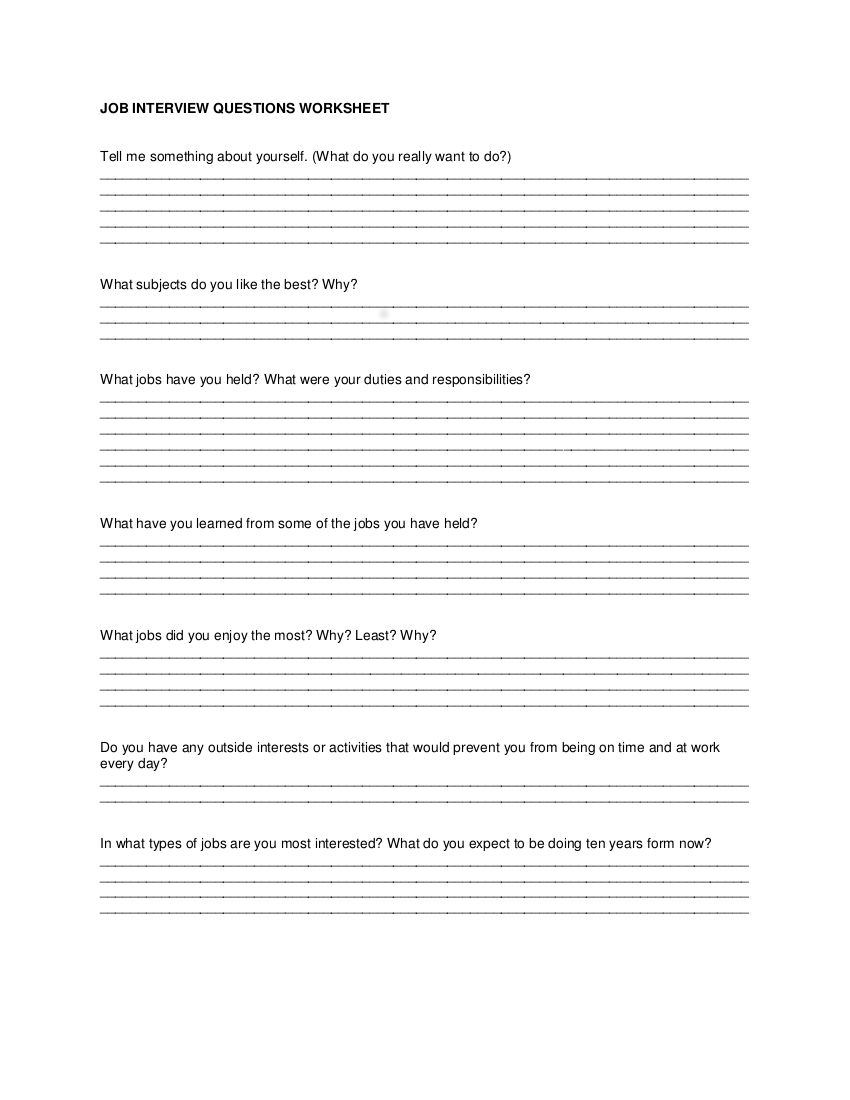
iecc.edu
Details
File Format
PDF
Size: 88.2 MB
Pre-Interview Worksheet
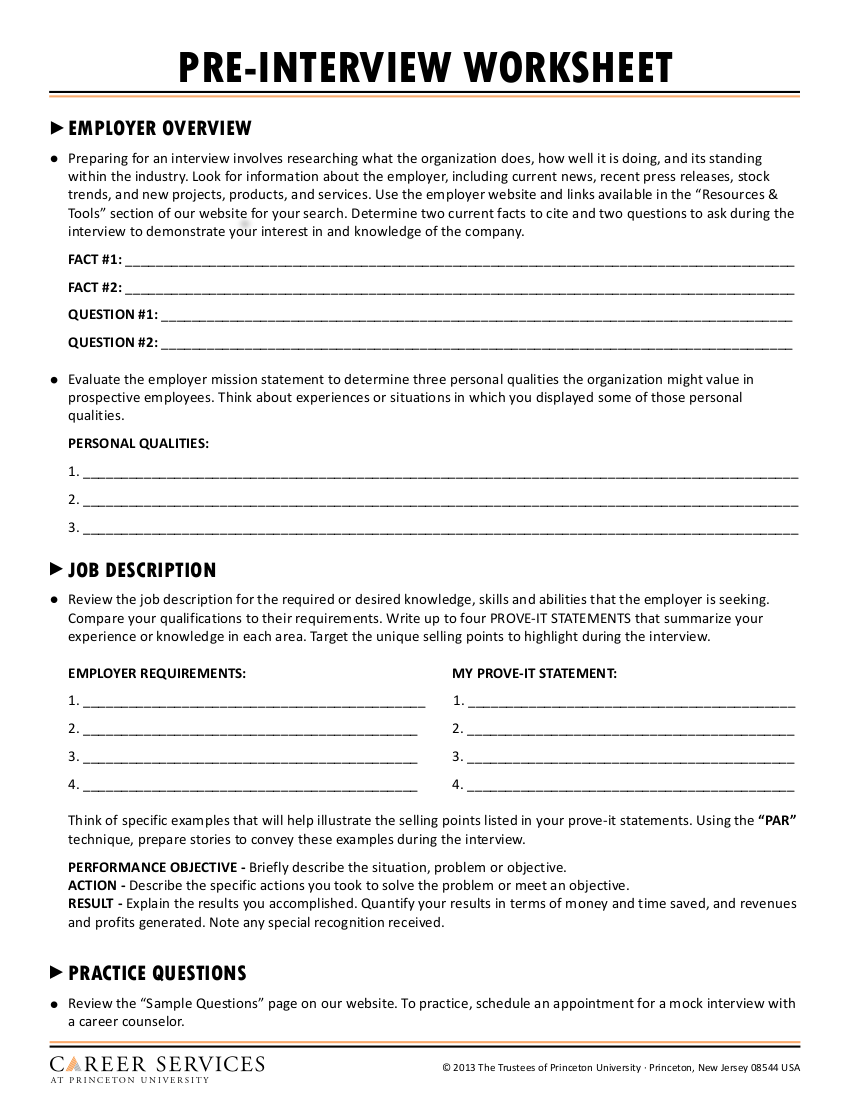
careerservices.princeton.edu
Details
File Format
PDF
Size: 592.3 KB
The Common Interview Process
Here are the steps in the common way interviews are done:
Stage 1: What Information Do You Need?
It is at this stage where you will determine what information is required and what you want to find out from the person you are going to interview. This is the stage where you are going to think of all the questions you want to ask your interviewee. You may also see Budget Worksheets.
Stage 2: What Method are You Going to Use in Collecting Data?
Now that you have decided what information you want to acquire from the interviewees, you now have to decide the method or how you are going to collect data from your respondents or from the person you are going to interview. Your interview could be conducted by face-to-face, by using chat messaging services, but it is strongly suggested that you should conduct the interview personally because the latter does not have the assurance that your interviewee’s answers are not coached or influenced by other people around him or her that you cannot see. You can also conduct an interview via a telephone call and you just ask permission from the interviewee that you are going to record. You can also conduct an interview via video phone call. This is another alternative to substitute face-to-face interviews instead of just having a chat messaging where you cannot see the person you are interviewing. You may also see 10 Coaching Worksheet Examples in PDF.
Stage 3: Set the Interview
This is the time when you would finally schedule the time, place, and date of the interview. Make sure you have set the interview at a convenient time for the interviewee so that there will be no problems. You may also know How to Write a Newspaper Obituary (With Examples).
This is also the stage where you have to check back again the questions you have prepared. Ask yourself the following questions when you will check the questions again:
Are the questions easy to understand?
Are the questions biased or not?
Are the questions necessary to the evaluation?
Are the questions too intimidating to answer?
Will interviewees be willing to provide the information with this kind of questions?
Are the questions applicable to all interviewees?
Does the question allow interviewees to offer their opinions/expand on basic answers?
Would followup questions likely to happen?
Are these all the needed important questions or should I add more?
Stage 4: Pilot Test the Interview
While this stage can be optional especially if you do not have an extra time, conduct the interview with someone to people that are potential interviewees but are not the actual ones.
Stage 5: Conduct the Interview
Finally, you can now conduct the interview.
Before the interview, you have to ask permission from your interviewee that you are going to record the entire interview and you have to assure and confirm to them that if they will request anonymity, it will surely be granted as they wish.
You should also have to mention the purpose of your interview and how you are going to use the information you are going to obtain from them.
If you have a time limit for the interview, make sure that you stick to it.
Stage 6: Transcribe Interviews
Now that you are done with the actual interview, it is now the time for you to transcribe the interview.
Stage 7: Analyse the Transcripts
Analyzing the transcripts will enable you to effectively do the next stage which is:
Stage 8: Write, Present, and Use the Findings
Be it for a news article, a job interview or for a study, this step is the most crucial part where you will finally make use of what you have obtained from the interview. Make sure you have extensively used the article so that your efforts in conducting the entire interview process would not be put to waste.

